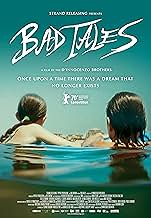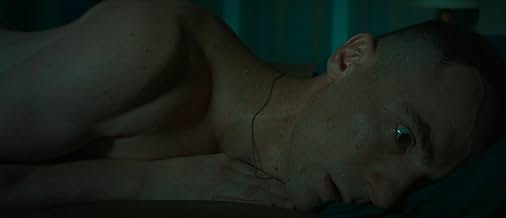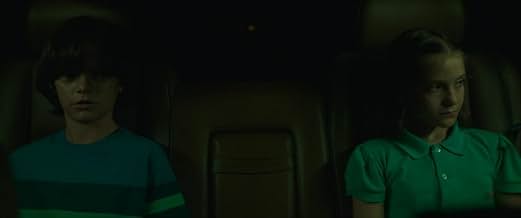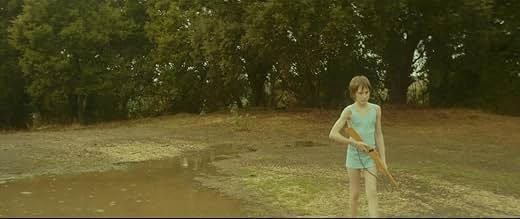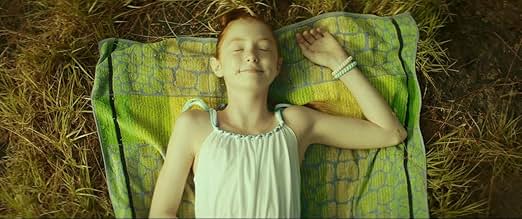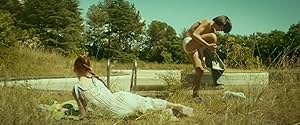IMDb RATING
6.4/10
7.3K
YOUR RATING
A few families living out on a limb in the suburbs of Rome. Tensions here can explode at any time; ultimately it's the children who bring about the collapse.A few families living out on a limb in the suburbs of Rome. Tensions here can explode at any time; ultimately it's the children who bring about the collapse.A few families living out on a limb in the suburbs of Rome. Tensions here can explode at any time; ultimately it's the children who bring about the collapse.
- Directors
- Writers
- Stars
- Awards
- 22 wins & 28 nominations total
- Directors
- Writers
- All cast & crew
- Production, box office & more at IMDbPro
Featured reviews
Co-directed by brothers Damiano and Fabio D'Innocenzo "Bad Tales" is a dark, downbeat and really rather unpleasant film seriously lacking in the 'feelgood' factor. It's also rather good in a horrible, queasy kind of way; a film to admire for the obvious skill the filmmakers demonstrate but certainly not a film to like. Set during one summer in a suburb ouside Rome it looks, somewhat forensically, at a couple of very dysfunctional families much in the style of Yorgos Lanthimos. The brothers never quite reach the heights that Lanthimos does but we are definitely in the same perverse ballpark.
Both adults and children are treated with the same off-hand cruelty while their actions are never really explained. There's something almost surreal going on here and not in a good way but then the film is called "Bad Tales" so don't say you weren't warned. I doubt if I'll be returning to it anytime soon but while the brothers may not be the Coens I will certainly be interested to see what they do in the future.
Both adults and children are treated with the same off-hand cruelty while their actions are never really explained. There's something almost surreal going on here and not in a good way but then the film is called "Bad Tales" so don't say you weren't warned. I doubt if I'll be returning to it anytime soon but while the brothers may not be the Coens I will certainly be interested to see what they do in the future.
Seen at Berlinale 2020, it is a film that looks at the relationships between parents and children. There is a lot going on in this little Italian suburb, but one thing is for sure, the parents make much more noise than the children. It is a story about growing up or never managing to do so. Worth seeing.
It's hard to review such a title: talking about the plot might give away too much or be misleading. I'll just write my observations on the final product: not very useful for those who have to decide whether to watch it or not but well... that's it.
Despite the initial word joke about the source material, I found the story quite inspired - whether it is supposed to be true, made up, a mix, a fairy tale or whatever hermeneutical meta-perspective we are supposed to adopt. Inspired, as was the previous (and first full length) film written and directed by the D'Innocenzo brothers: "La terra dell'abbastanza". Unfortunately I found here the same problems I found there: the overall result is uneven, disjointed, a little inconsistent and often cold.
By cold, I don't mean that it lets the viewer feel the unbridgeable divide between these kids/adolescents and their parents: that divide emerges as an overall unwillingness of adults to understand (or even listen) to kids. By cold I mean that while I wasn't bored wacthing the film, I didn't care either about most of what happened to most of the characters: alienating. Among other things this is mainly due to scenes too stylized/simplistic and to the acting from the kids which - with few exceptions - is not good enough.
At times surgical in a too detached way and others indulging in irrelevant details that just stress the same buttons or feel gratuitously obscure. Finally - and in this worse than "La terra dell'abbastanza" - "Favolacce" feels sometimes inconsistent even for those willing to spend time trying to decipher the code:
Or the questions ARE the story, and we're just tricked with opaque symbols and vague happenings into believing that there's more (and in this "La terra dell'abbastanza" fared better given its plain Noir status). I don't feel like attempting to reach the "hermetic intellectual heights" of any author: for sure I won't make an exception in this case.
Still some scenes and characters magnetize the viewers' attention and alone deserve to be watched (thanks to both the direction, supporting actors like the very good Ileana D'Ambra and Barbara Chichiarelli and/or the writing).
Surely I won't miss D'Innocenzos' next work: yet - and I'm really unsure which one - I would suggest to the authors to work together with a better screenplayer, a better director or both.
Despite the initial word joke about the source material, I found the story quite inspired - whether it is supposed to be true, made up, a mix, a fairy tale or whatever hermeneutical meta-perspective we are supposed to adopt. Inspired, as was the previous (and first full length) film written and directed by the D'Innocenzo brothers: "La terra dell'abbastanza". Unfortunately I found here the same problems I found there: the overall result is uneven, disjointed, a little inconsistent and often cold.
By cold, I don't mean that it lets the viewer feel the unbridgeable divide between these kids/adolescents and their parents: that divide emerges as an overall unwillingness of adults to understand (or even listen) to kids. By cold I mean that while I wasn't bored wacthing the film, I didn't care either about most of what happened to most of the characters: alienating. Among other things this is mainly due to scenes too stylized/simplistic and to the acting from the kids which - with few exceptions - is not good enough.
At times surgical in a too detached way and others indulging in irrelevant details that just stress the same buttons or feel gratuitously obscure. Finally - and in this worse than "La terra dell'abbastanza" - "Favolacce" feels sometimes inconsistent even for those willing to spend time trying to decipher the code:
- who is this narrator that talks like columnists (and screenplayers..) write, finds quite an intellectual's hobby, but has the most unrefined and boorish accent of the film?
- are we supposed to (re-)read "the Canterville Ghost" to LOVE the movie?
- are we supposed to listen again and again to the badly pronounced/registered dialogues to not miss what's said?.
- are we supposed to give our own answers to these and all the other questions that arise watching this "fable"?
Or the questions ARE the story, and we're just tricked with opaque symbols and vague happenings into believing that there's more (and in this "La terra dell'abbastanza" fared better given its plain Noir status). I don't feel like attempting to reach the "hermetic intellectual heights" of any author: for sure I won't make an exception in this case.
Still some scenes and characters magnetize the viewers' attention and alone deserve to be watched (thanks to both the direction, supporting actors like the very good Ileana D'Ambra and Barbara Chichiarelli and/or the writing).
Surely I won't miss D'Innocenzos' next work: yet - and I'm really unsure which one - I would suggest to the authors to work together with a better screenplayer, a better director or both.
This Italian Swiss TV coproduction with Sky TV won a screenplay award at the Berlin Film Festival. We saw it in a group of cinephiles. In the discussion afterwards we could not find one reason how this could have been possible. Maybe every other film in the contest was written worse, but that is hard to imagine. Maybe the jury wanted to play a practical joke. Even the narrator in the film apologizes for the senslessness and boredom of these random and badly written script. Any of the scenes could have been replaced with any other. It makes no difference. It was sad to witness how the art of film has deteriorated both in the making and in a venue of appreciation that once held some prestige. Nice cinematography though, one star for that and one for casting.
This movie stages action in a domestic and familiar environment, where violence never explodes, because violence is not a disturbance of that social order, but a pillar: it's behind every gesture, every word, every thought, it's something sinister always lurking inside the grownups (in a minor but important scene, during a birthday party the adults say horrible words towards a mother - but in whispers, like if they were haunted).
Parents shows and expose their kids as trophies, not caring for them but for themselves: in another scene a young father is pleased by the driving skills of his own son and proudly screams "You are like me!" - something that the kid is obviously not willing to be. Generations basically ignore each other's feeling: and ignorance is the trigger of silence, silence is the trigger of despair, and despair the trigger of violence.
Thanks to silence, conflict is invisible, and for this reason it becomes eventually inescapable: and the surprising epilogue is the only moment when peace is restored in the families, as the parents for the first time looks like they are actually caring for their children. We hear from the narrator at the beginning that everything in this story is at the same time true and false: and eventually we understand that this mix creates a scaring thing, called reality. This movie is good cinema and great advice, you should see it.
Parents shows and expose their kids as trophies, not caring for them but for themselves: in another scene a young father is pleased by the driving skills of his own son and proudly screams "You are like me!" - something that the kid is obviously not willing to be. Generations basically ignore each other's feeling: and ignorance is the trigger of silence, silence is the trigger of despair, and despair the trigger of violence.
Thanks to silence, conflict is invisible, and for this reason it becomes eventually inescapable: and the surprising epilogue is the only moment when peace is restored in the families, as the parents for the first time looks like they are actually caring for their children. We hear from the narrator at the beginning that everything in this story is at the same time true and false: and eventually we understand that this mix creates a scaring thing, called reality. This movie is good cinema and great advice, you should see it.
Did you know
- How long is Bad Tales?Powered by Alexa
Details
- Release date
- Countries of origin
- Official site
- Language
- Also known as
- Sages comme une image
- Filming locations
- Production companies
- See more company credits at IMDbPro
Box office
- Budget
- €2,000,000 (estimated)
- Gross worldwide
- $208,419
Contribute to this page
Suggest an edit or add missing content


![Watch Trailer [OV]](https://m.media-amazon.com/images/M/MV5BZDVkZjQxODYtZjllYi00ZTU4LWEyZTctN2Q5YWYwZDljNjA0XkEyXkFqcGdeQXRyYW5zY29kZS13b3JrZmxvdw@@._V1_QL75_UX500_CR0)


